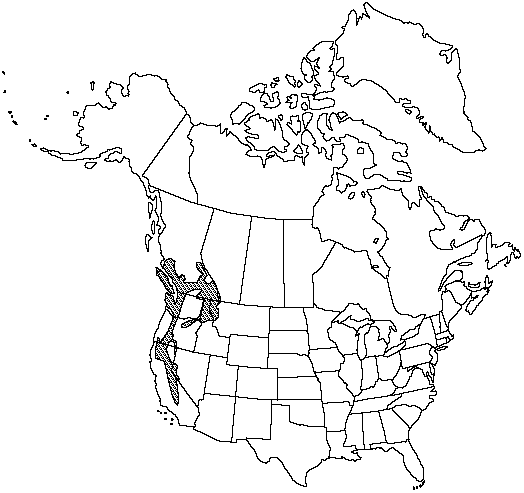Pinus monticola
in Lambert, Descr. Pinus [ed. 3] 2: unnumbered page between 144 and 145. 1832.
Trees to 70m; trunk to 2.5m diam., straight; crown narrowly conic, becoming broad and flattened. Bark gray, distinctly platy, plates scaly. Branches nearly whorled, spreading-ascending; twigs slender, pale red-brown, rusty puberulent and slightly glandular (rarely glabrous), aging purple-brown or gray, smooth. Buds ellipsoid or cylindric, rust-colored, 0.4–0.5cm, slightly resinous. Leaves 5 per fascicle, spreading to ascending, persisting 3–4 years, 4–10cm × 0.7–1mm, straight, slightly twisted, pliant, blue-green, abaxial surface without evident stomatal lines, adaxial surfaces with evident stomatal lines, margins finely serrulate, apex broadly to narrowly acute; sheath 1–1.5cm, shed early. Pollen cones ellipsoid, 10–15mm, yellow. Seed cones maturing in 2 years, shedding seeds and falling soon thereafter, clustered, pendent, symmetric, lance-cylindric to ellipsoid-cylindric before opening, broadly lanceoloid to ellipsoid-cylindric when open, 10–25cm, creamy brown to yellowish, without purple or gray tints, resinous, stalks to 2cm; umbo terminal, depressed. Seeds compressed, broadly obovoid-deltoid; body 5–7mm, red-brown; wing 2–2.5cm. 2n =24.
Habitat: Montane moist forests, lowland fog forests
Elevation: 0–3000m
Distribution

Alta., B.C., Calif., Idaho, Mont., Nev., Oreg., Wash.
Discussion
Pinus monticola is the most important western source for matchwood. Its wood lacks the sugary exudates seen in P. lambertiana.
Western white pine (Pinus monticola) is the state tree of Idaho.
Selected References
None.